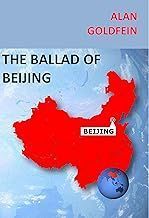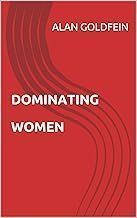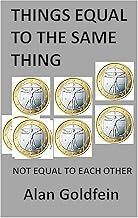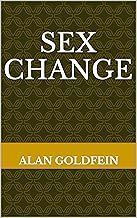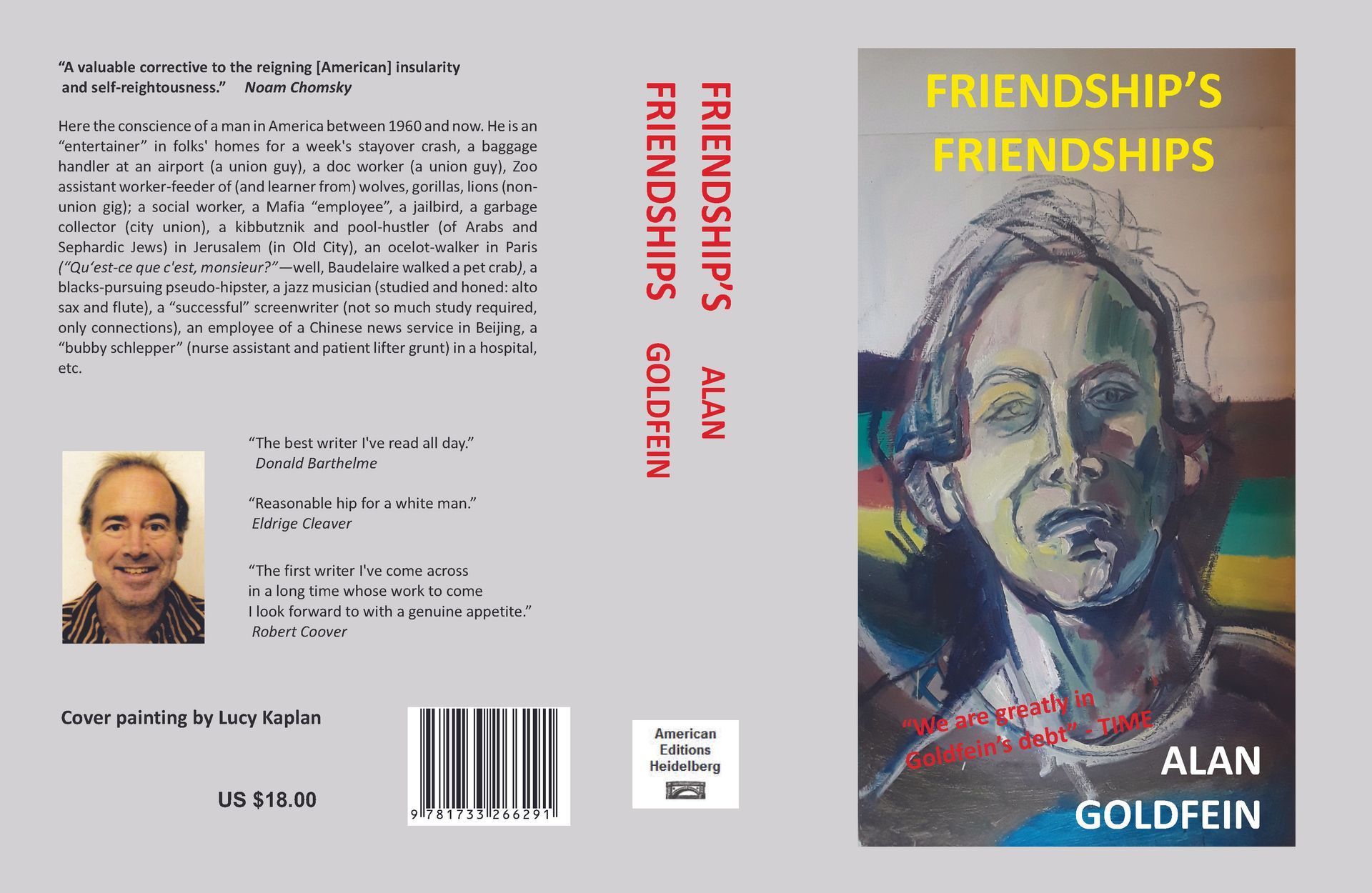Gallery
Books published in Germany
by American Editions Heidelberg
Jews and Germans / Germans and Jews
by Alan Goldfein, 2nd edition 2006
In this novella and short stories, Alan Goldfein carries us through the adventures of American Jews in today's Germany, a land still haunted by yesterday's Germany.
In Deutschland on business, or by marriage, or seeking something lost, these "visitors" share a shadowed chord with the natives, even in moments of comedy, exuberance and hope:
A young man dances with a Fräulein at a Maipole celebration; a Jewish musicologist is joined on the Berlin subway by a skinhead; a reconciliation group is shattered by a shocking revelation.
Dopplegängers abound in these compassionate and lyrical portrayals of strained reunion.
Europe's Macadam / America's Tar
In this meticulous "exposé", which is still up-to-date and manages to be humorous
while yet compelling, Alan Goldfein tackles The European Reality and the American Delusion - about itself and about Europe. By exploring Europe in order to better understand America, he is able to cast a broader light on what must be done to fire up our own national renewal.Carefully selected examples are bringing to light how America does suffer in a faceoff with "the old world":
You should get sick in Europe, not in the U.S.; for wages, free-time, companionship, and respect it's better to be an employee in Europe. Life there revolves about Community, and life gravitates to the Individual in America, ... and the roads are far more durable in Europe.
Let Us Now Praise America
by Alan Goldfein, 2011
America's Value Despite its Faults
In this insightful book America finds its rightful place, neither as a nation to be overwhelmingly faulted nor as a country to be uncriticly lauded.
By colorfully examining politics, economics and the general psychologies of its citizenry, as well as various arts and practices, from auto driving to journalism to movie-making, Alan Goldfein has tried, with perception, wit and affection, to give us an as accurate as possible picture of this great and varied nation - and a dynamic portrait of that nation at a crossroads.
The Black Wife
by Alan Goldfein, 2009
An American Epic of American Racial Times
At once a radical black-white marriage history and a radical U.S. history, written in Alan Goldfein's uniquely poetic, and witty prose, The Black Wife finds its focal point in Baltimore, "the most northern of the Southern cities, the most southern of the North" - the nation itself becoming a kind of solar system through which "The Black Wife" travels:
Carol "Poussaint" Polson marries a white man, and has his son, who struggles within a lineage tug-of-war, torn by the inescapable ironies of race, the passionate hopes of race and the divisions.
Carol has grown up in Baltimore at the same time that Nancy Pelosi has grown up in Baltimore, one a daughter of the ghetto, one a daughter of the mayor: they meet in a violent way, symbolic of the Sixties. Their lives obliquely parallel - until they meet for a final tragic time, symbolic of the Nineties. And symbolic of Now.
The Guidance Counselor
A Novel, by Alan Goldfein, 2013
Berkeley: The guidance counselor needs guidance. His Norwegian girlfriend is discontented; his ex-wife feels not dissimilar: while searching for spirit, the counselor is bleeding from material parts best left unmentioned; his grandson has fallen in love with a girl unapproved-of by the family, as she is "Nice but black" - and he has fallen in love with that selfsame girl. For him the race problem is no problem. Age is. As is the astonishing fact that this poetically gifted girl, this incurable truth seeker, seems to like this oldie fellow back.
In this novel of original sensibility we have a spiritual man in his own honestquirky way, a conscientious and fiercely compassionate man who has tried to guide adolescents during the length of his working life, who now must fight being an adolescent chaser and becoming an adolescent then himself. The road to good intentions can be paved with hellish tars.
Yes, this is peerlessly funny stuff, but its dilemmas scrape against life's painful truth as well.
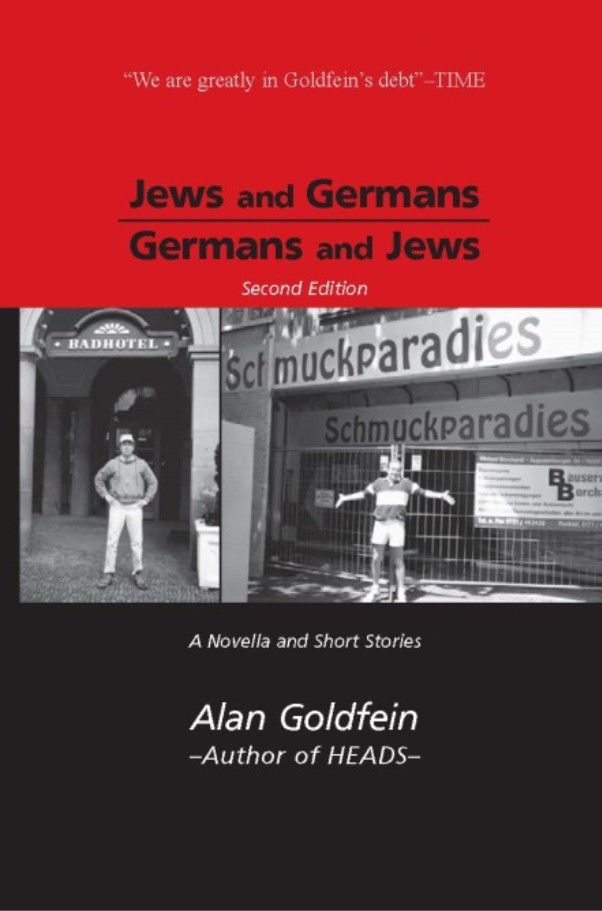
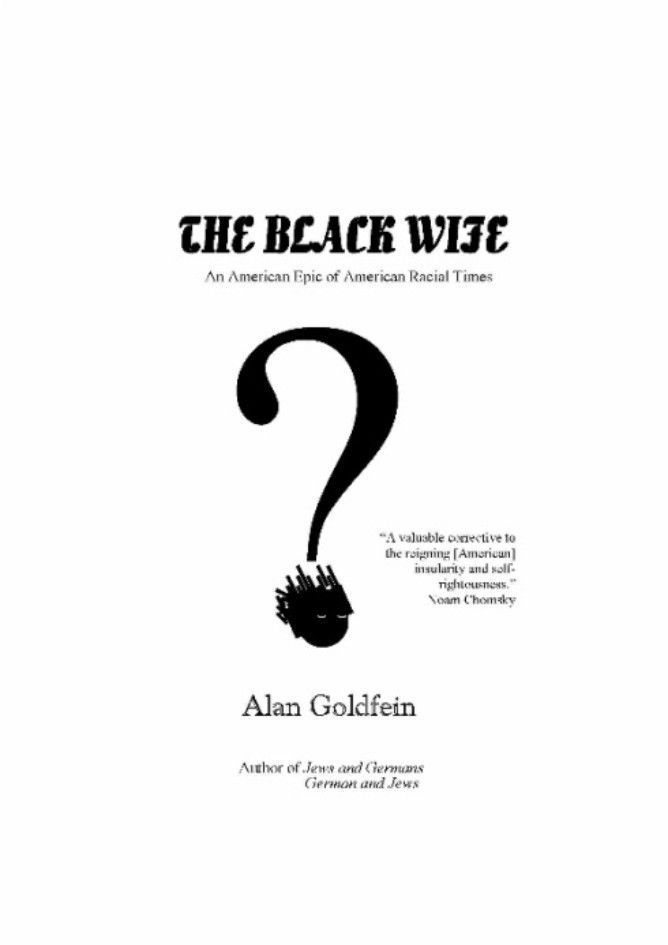
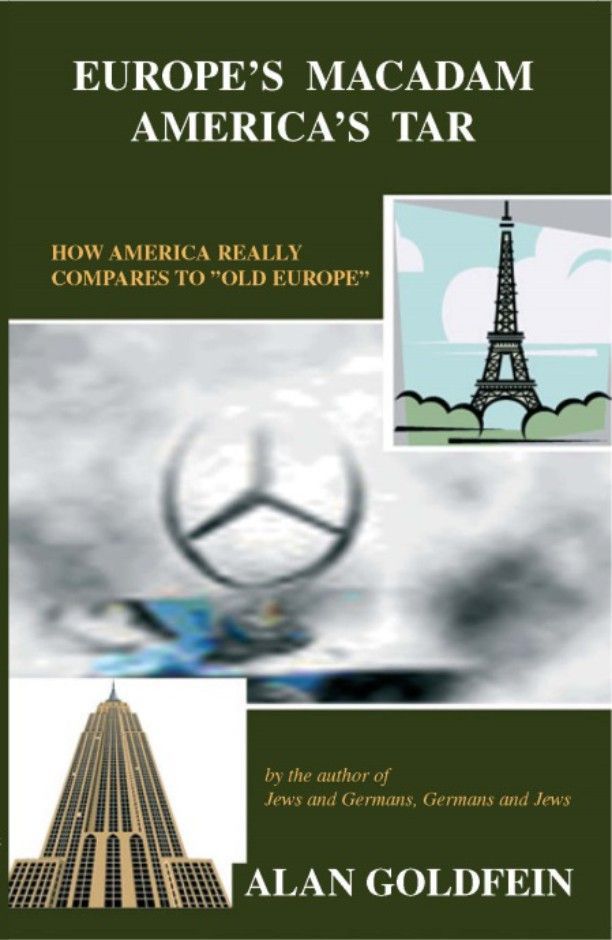
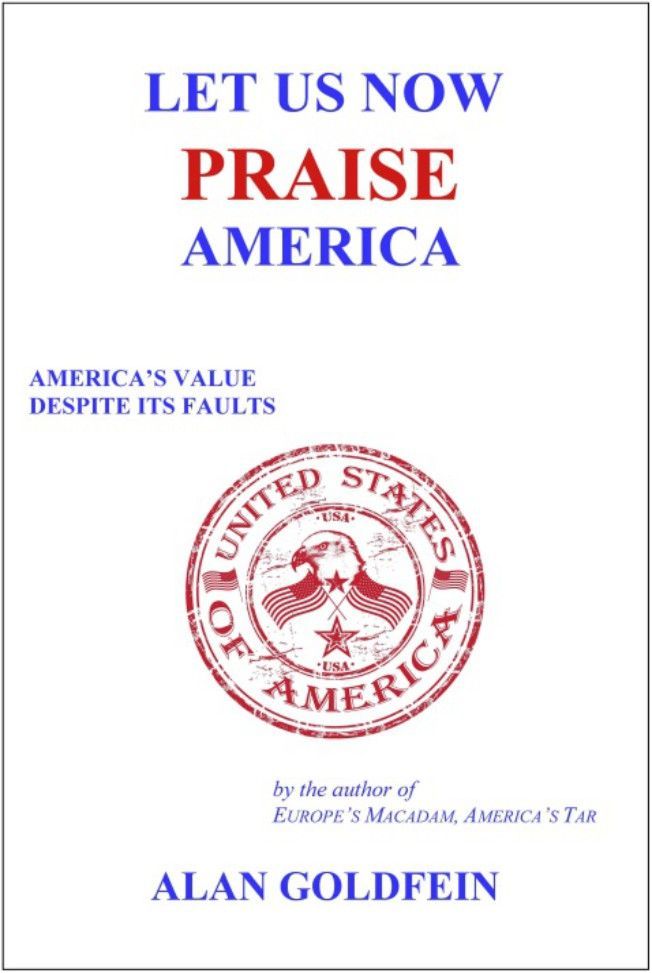
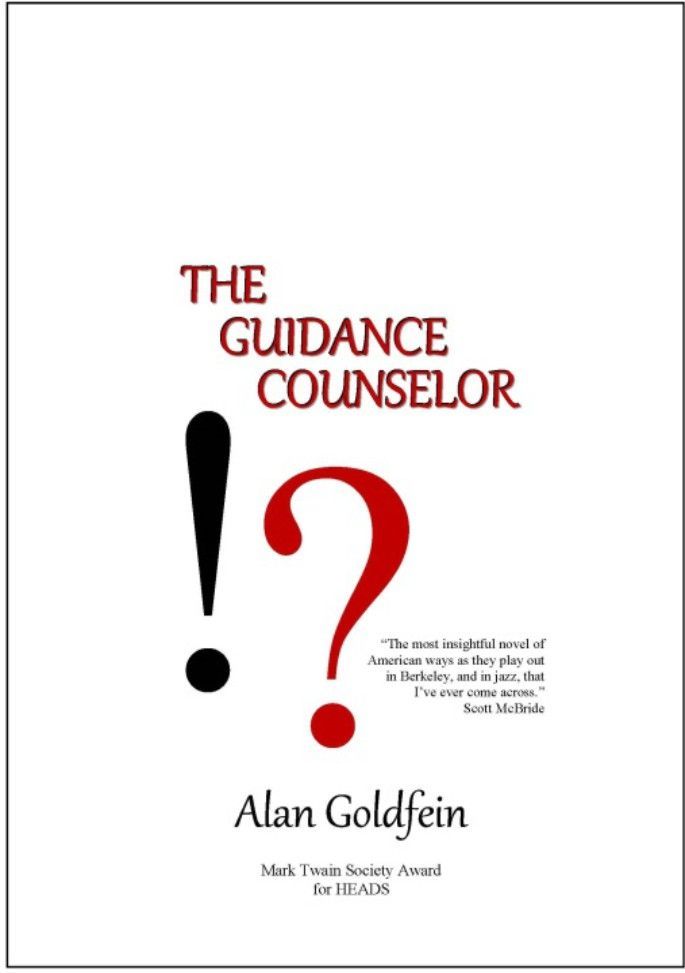
Gallery +
Books published worldwide
via Amazon's Kindle Store
"I love to write" -says Alan Goldfein on his author page at amazon ...
As he has taught history at Carnegie-Mellon-University, and economics at the University of Maryland, his writings tend towards combining these fields with fiction – and Europe thrown in the bargain, having lived there during several decades.
Alan Goldfein’s fiction includes stories about the adventures of American Jews in today’s Germany, explorations of Europe in order to better understand America, and poetic analysis of stereotypes and their consequences in the U.S.
During an extended stay in Germany, the novels Jews and Germans/Germans and Jews, The Black Wife, and The Guidance Counselor were created as well as the non-fictions Europe’s Macadam/America’s Tar and Let Us Now Praise America.
Alan Goldfein is also the author of Heads, and has been anthologized in a Random House Collection, On the Job: Fiction About Work. In the 1970s, he received the Mark Twain Society Award and a New York State Council of the Arts award for fiction.
He has also written numerous episodes for television series, such as Knots Landing, Perfect Couples, Bodies of Evidence, and Paradise.
.
The Ballad of Beijing
Arthur Becker, 44, writer, Lufthansas to Beijing—from Frankfurt. American Jew (Berkeleyite but married to a German professor [Jutta]), he has lived in Heidelberg for over twenty years. There are two reasons why Becker has flown to Beijing: His son, Mick (Mick-ah-yell) attends Peking University (still known for some reverent reason by that ancient pre-Mao name). The Turgenev father-son anguish (in this case, a German kid with a Jewish-American dad) have caused Mick to escape any further conflicts (there have been many), plus China (as Mick says) has these days magnificent universities devoted to business, marketing, etc.—and the kid is now about to marry this Hung, a classmate. . . Becker has also made his way to China because he has killed Doctor Fritz Strobel, an old professor-mentor of Jutta’s, and still a vociferous (on the super-sly) Nazi. Becker hadn’t planned to take the man’s life, but . . .
Beijing is Capitalism City: Bling Town and The Burg of Barbarity. Example: Ricky Rubalcava, an “entrepreneur” from Havana, “imports” that impoverished Caribbean town’s surplus of Fifties U.S. autos, now for the fancified Beijingoisie. Skyscrapers shoot up as rapidly as ICBMs, the scrambled poor-in-the-streets beneath remind Arthur of those sprawled in The Bowery. Circumstances bring Becker to an underground: Tibetans persecuted not unlike (thinks Becker) Jews in old Berlin: Nyemo, a Tibetan, a thief, a non-Buddhist, a sentimental hothead not unlike Arthur Becker (going against Tantric Tibetan-type here—but there’s plenty of this in Beijing), Nyemo has cuckolded Becker’s son Mick with his fiancé Hung. Becker hates Nyemo, and, as a Jew in Germany, even today’s Germany, he also identifies with the victimized Tibetan —Becker even wishes that his Mick could be more like him. Hung’s father, Jin Jianxin, is a civil libertarian, once jailed, highly respected—but he also “enjoys” the hardgloss patina of a man who might well have written The Art of the CHINESE Deal. Hung loves Mick (in her way); and she loves Nyemo (in her way). Jin Jianxin, that brave social reformer, must employ his tightrope cunning to have Nyemo dispensed with—and it is a rather deadly “dispensation”. This sleight-of-hand is the moral behavior of an ombudsman? How does the “good” man justify what he has done to the Tibetan? Becker is torn between moralities—especially as government enforcers come after him for his association with the rebel Tibetan. Under heavy psychic pressure, Becker returns to face his own murderer-fate in Germany.
Sex Change
Transubstantiation: Arthur Becker is born with a vagina. He (she) is named Marta. The “Arthur” comes by way of his implacable, relentless insistences. His (or her) instincts and interests are male, watch him toss a perfect football spiral—and other things: What can follow from such conflict but confusion and pain, and at an early age, when his body can tolerate nothing great in alleviation, only palliatives. He is raped. Years pass before he is able to absorb without great danger the major infusion of hormones (“Sorry but we can’t but be fucking with your frontal cortex”—his endocrinologist trying to be reassuringly lite-hip), and then the bigtime sine qua non, an actual (but of course jerry-rigged) penis—which, in low uncertain voice, the surgeon and the endocrinologists vouch, just might work—although then again “Medicine isn’t perfect, m’boy, some estrogen’s gonna be hangin’in there, son.” Experiments follow—meaning dates, with girls. Meaning right-fit careers for a “guy” like Arthur: Acting? Miming? Social work? As with all the best of life’s fixes, successes are dogged by (and twisted into) failures. Thus Arthur’s adventures and misadventures, some comic, some miserably tragic humiliations—hopes wrestling with despair—again again again. . . Again. Suicide “ideations” (one step above fantasies) tossed-about and intricately pictured. . . But life is faults and imperfections, all of it is, nothing of it isn’t—he learns this, he convinces himself to learn it: the greater the fault the greater the possible leap to understanding—well, eventually—and the greater the excitement of taking-in greater dimensions, those “the normals” could not possibly have absorbed—we’re talking here about Sex from the heart-mind’s many angles (“Some estrogen’s gonna be hangin’in there, son.”) . . . And Love?—halleluyah, a real woman, and one who suits this young man who was once an unreal woman. Seems like the “wisdom” he has found himself picking-up may actually be wise. Could be.Describe the item or answer the question so that site visitors who are interested get more information. You can emphasize this text with bullets, italics or bold, and add links.
Dominating Women
The doubl’entendre of the title is unavoidable. Look once it means one thing, twice it means the other. The Man wants to be Mister Potent at one time, The Woman wants her own power at the other. Or: their wants collide: Kablooey!
With an expiating cringe (that never expiated) Alan Geist used to joke-pun that his GEIST’S BIKES was his vehicle. What he’d meant was that GEIST’S BIKES was all things: his woman-school and his woman bar mitzvah and his invitation to some secret women’s group. Men bought bikes, fine, but it was women bike-buyers whose surprising variability—from the fragile to the apologetic to the seductive to the confident-investigative to even the fierce and raging—it was women who came to draw “innocent” Geist out from mere salesman, and an insecure unsalesmanish salesman at that, to a social scientist of sorts, a regretfully involved forensic-spy on that Other sex about which he’d known about as little as he did about the dark side of the moon—or for that matter the sunlit side. He learns from the emotionally vulnerable and mousy but muscularly ripe female body-builder champion Dale—or rather he learns while he discovers that he also teaches, an ambiguity with heartfelt tenderness; he cowers while he combats the compulsively domineering and flamboyantly inventive Eugenia (when she is not compulsively—and not so flamboyantly, submissive); he graphically “experiments” with his good-buddy Shel Sevenecker (exchange blow-jobs yet: a taboo “bravely” indulged-in [after wranglings over who would be the “pioneer” and go-blowing first] supposedly so as to “enlighten”: to study “the depths to heights of female ‘prickliness’ ”, to “learn-by-doing”, thus these two jerk-Darwins tell themselves); he “dates” Marie, a black woman whose political intellect is so similar to that of his lawyer wife’s, who he is betraying, Marie who intimidates him (in much the same fashion as does his wife Linda—who he “loves”); he meets a, well, “wonderful” “decent” “balanced” “trustable” “reliable” “generous” (and of course) “lovable” woman, a Lithuanian refugee from Russian incursion, a veterinarian, who, redundancies aside, just maybe, just maybe, just finally, he might be able to, on an even keel, what? “love”? . . . But, face it, Alan Geist, albeit tortured, is a rogue, a clueless stumblebum philanderer—for whom, and justifiably, all this “investigation” of his precipitates “answers” that are neither a “follow the yellow brick road” nor a Via Dolorosa.
THINGS EQUAL TO THE SAME THING: NOT EQUAL TO EACH OTHER
Buddy Becker lost his woman Sally Asher to a rabbi. Rabbi Paul Say. Buddy was a Jew. Buddy’s woman Sally was a prostitute, from the depleted coal-hills of West Virginia. Both Buddy and the rabbi had met Sally when cruising the main acknowledged Baltimore hooker street for what men cruise hooker streets for. Both Buddy and the rabbi, Paul, were men who were remarkable in their own ways—and certainly not for their hooker-proclivities. And Sally was as well a unique woman in her own right. First, the rabbi: Paul Say was a shy, sexually inexperienced bachelor in his late twenties, and he regarded that pallid greenness of his in life’s most crucial nature, most essential nature, as a considerable failing: how might he presume to, as it were, lead people, a congregation, even as a miniature modern image of, Moses? Maimonides? Abraham?—it pained him to even think of himself in the tradition of such giants of faith. The prostitute, this Sally, well she might at least help by lending the rabbi some level of experience—even if that experience would be stunted, stained and less than moral. The Rabbi Paul Say was a tormented man who, eventually, and not only because of his torment, came to find in himself a love for prostitute Sally Asher. Buddy Becker, the rabbi’s competitor for Sally’s love, is a hustler, but in a rather benevolent non-mercantile motif, and a reader who claims to have read Everything, from the ancient Greeks on through James Joyce. This “hustle scholarship” has allowed Buddy his survival-by-entertainment: the permission to mooch at friends’ houses —if the moochee happens to be a woman. A bit of Aristotle said this, Heidegger said that, and Buddy The Explainer, is in. . . But when Buddy finds himself womanless, he finds a hooker.
But hooker Sally Asher is different. She’s special—her sentiments, her perceptions, her instinctive understandings, even her weaknesses. She may be the most honest and trustworthy of this unlikely trio. The rabbi’s cruising for a prostitute had to do with embarrassment and inexperience and the painful contest between biology and religion, while Buddy Becker’s cruising had to do with habit and spare time killing, and fun. But both men, afflicted by their warpings of weakness, fell in love with this unusual lost “hickabilly”, who was, in her way, one strong woman, survival-bent. . . Emotional adulthood for hustler and for rabbi? Two marred men to be stirred and risen.
FRIENDSHIP'S FRIENDSHIPS
An odyssey: Arranged around the themes of friendship and community, the book traces the character and conscience of a man (young and old: son of a major loner and minor league pitcher [rare for a Jewish man]), always soul-searching while trying to give an accurate account of the social and political climates of America in the years between 1960 and now. The main character, Alan, is sustained by an instinctive search for a good-enough faith to live by – which he does find. . . And, sure enough, too, Love.
Along the way he is an “entertainer” (intellectual, faux and genuine) in folks’ homes for a week’s stayover-crash, a baggage handler at an airport (a union guy), a doc worker (a union guy), Zoo assistant worker-feeder of ( and learner from) wolves, gorillas, lions (non-union gig); a social worker, a Mafia “employee”, a jailbird, a garbage collector (city union), a kibbutznik and pool-hustler (of Arabs and Sephardic Jews) in Jerusalem (in Old City), a cabbie (of course), a Jew-in-Germany (with the best friend he ever had—German), an ocelot-walker (“Quest que c’est monsieur?”—well, Baudelaire walked apet crab) in Paris, a blacks-pursuing pseudo-hipster, a jazz musician (studied and honed: alto sax and flute), a “successful” screenwriter (not so much study required, only connections), a Thoreauvian hermit in a mansion (as trusted house sitter: lonely, he invites-in a group of “crazies”), an employee of a Chinese news service in Beijing, an investigator of the Republican Right for a major magazine, a private editor and lover of a bellydancer in New York—where he’s a bit of a minor bigtime socializer (the sweet bellydancer is trying to write a definitive work about bellydancing—oy gevalt), a private equity guy (low level, with guilt and pranks and near undoing of that vile destructive firm), a father, a “bubby schlepper” (nurse assistant and patient lifter grunt) in a hospital, a community organizer in Chicago, etc. . . Until he learns that Life . . .
2 0 3 5
It’s a futopia, or dystopia, for today, as the Orwellian title indicates. It’s set in 2035, where the technical, political, business and juridical developments of our times have come to overwhelming fruition and thoroughgoing dominance. Surviving as an “individual” within this new world where Freedom is an irony is the “hero”, or protagonist, or anti-hero. His name is Guy.


